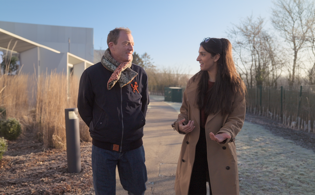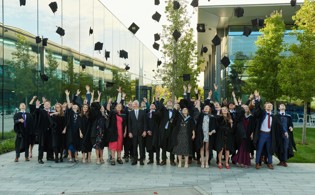
What is a conversion course?
What is a conversion course?
A higher education conversion course is inherently designed to transform learners from one subject area to another. These types of course afford the opportunity to gain the necessary knowledge, skills, and pre-requisite practical application needed to successfully transition into a new subject area and/or profession.
As of this year the Dyson Institute is now offering its first conversion course, the MSc in Software Engineering, which is open to graduates who haven't studied computer science or software engineering previously.
How does a conversion course work?
Conversion courses are typically shorter than a standard undergraduate degree, despite being at the higher master’s level. With this type of course, emphasis is initially placed on slowly building knowledge from the fundamentals - this is often why many conversion courses include introductory modules at an undergraduate level to help ease learners into the new subject area.
Through time and exposure to the subject area, knowledge and a toolbox of core skills and competencies are accumulated that can be later applied to different areas of the subject as the course progresses.
Conversion courses are designed to utilise learners’ diverse backgrounds, experiences, and skillsets to enhance the learning experience and to approach the subject and problems from unique perspectives.
What qualifications do I need for a MSc conversion course?
We require a good standard (2:1) undergraduate qualification, right to study and work in the UK which covers the duration of the programme and the commencement of your Dyson career thereafter. We’re looking for aptitude and a keen interest in technology, so demonstrating your extra-curricular activities that give light to this in a digital domain are most definitely worth elaborating on! Whether it be building a website, attending a hackathon, or learning to code in your free time.
Why should you do a conversion course?
By the very nature of going to university to undertake study of a particular topic, this can potentially reshape how you think about the topic and how you position yourself in that domain. Sometimes, either during the learning experience or later in employment, you come to realise your passion and interests lie somewhere else. Our MSc Software Engineering course exist for this reason as it allows you to harness the skills and competencies you’ve already gained and apply them to a technology and digital domain. Our conversion course provides credibility without you having to start over while simultaneously advancing your career in a truly global sector. The digital sector boasts excellent career prospects, salary, and opportunities to continue your learning and skills development.
Why do a MSc conversion in software engineering?
The demand for software engineers is at an all-time high, with the demand set to increase in the future. To address the current shortage of skilled software engineers at Dyson our conversion programme will provide you with not only a robust academic background, but with hands-on industry experience to kickstart your digital career. From the outset, you’ll be in the driving seat of your career with a competitive starting salary at a leading global technology company.
Who can do a MSc conversion course?
If you’ve got a first degree to a 2:1 standard which is not in Computer Science or Software Engineering, we’d really like to hear from you!
Why is diversity of thought important?
Software engineering, unlike many other domains of engineering, boasts a broad range of methods, tools, and techniques that allow you to approach problems from innovative and unique perspectives. At Dyson, we embrace diverse and creative ways of thinking, believe us; we have a track record in understanding how it leads to innovation and creativity! Our conversion programme reinforces this by being open to anyone not already qualified or experienced in a computing or software engineering domain. We are looking for talented individuals who approach problems from a different angle and taking the skills you already have and transferring them into software engineering.
How much does a conversion course cost?
Our conversion programme is employer funded so the costs are absorbed by Dyson upon your successful completion of the programme. This is typical and its quite common for employers to fund postgraduate study however, we differ in that we allow you do this from the outset, rather than having to be employed in the organisation for a period of time. Our conversion opportunity allows you to work and study at the same time, while building your career from the very start.
Why are we different?
Over 50% of students typically work alongside their postgraduate studies in order to fund their education and day to day living. Gaining suitable work experience is normally attained through placement years or external opportunities, which can add further stress or difficulty to the journey.
Our conversion programme offers you a postgraduate qualification, relevant hands-on workplace-based experience, and a salaried income from the outset to allow you to have peace of mind and a better work life balance, without the need to worry.


